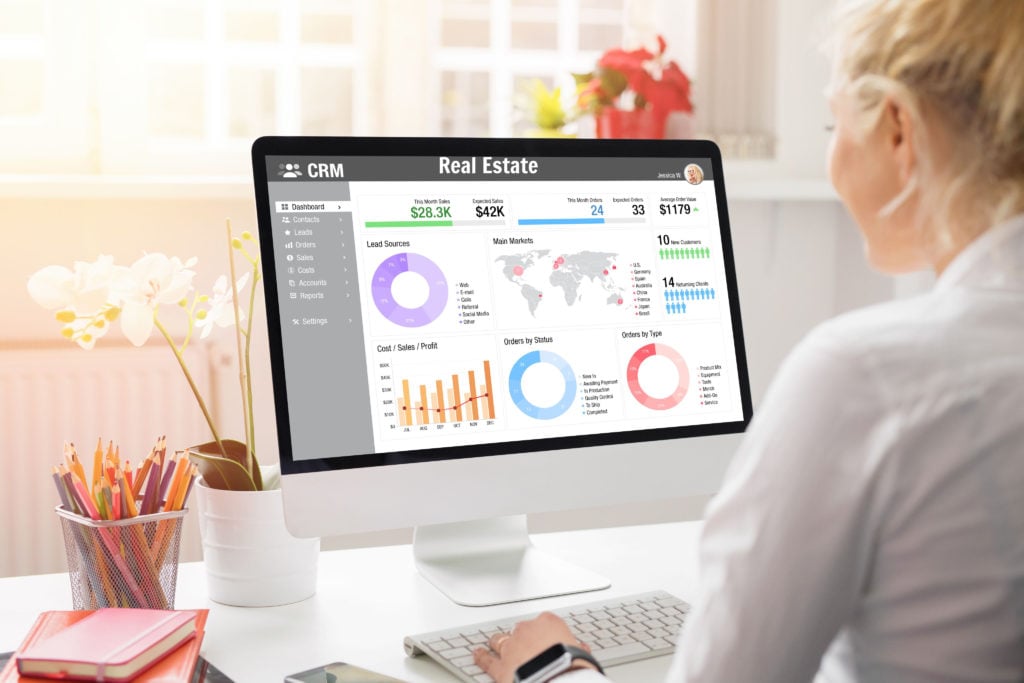No matter what type of real estate professional you may be, you need to use the right tools for the job to keep your business running smoothly. This is true for brokers, investors, and real estate agents alike – no matter how you interact with the field of real estate, time-saving, productivity-increasing tools that streamline your business and enhance your customer relationships are invaluable.

That’s where real estate CRM comes into play. These unique software platforms are ideal tools for providing your real estate business with the organizational support it needs to be successful. As a result, restate CRM is a crucial component of doing business in the real estate sector. Here’s what you should know about what a real estate CRM is, the benefits of using one, and how a real estate CRM can help your own business be more successful.
Real estate CRM is a software platform that provides real estate professionals with a suite of tools they can use to benefit their business. What does CRM stand for in real estate? That would be Consumer Relationship Management – and that’s exactly what a CRM platform does. Tools for tracking interactions with clients and recording valuable information about them and what they need are some of the most common tools you’d find in a high-quality CRM for real estate investors or agents.
Real estate CRM tools are varied. They often include email scheduling capabilities for automating communication with clients and detailed databases that allow agents or investors to record each client interaction by date. Because CRM platforms are often hosted on cloud-based platforms, they can also facilitate collaboration between colleagues through better intra-company connectivity, especially for agents out in the field and without traditional access to the office.
Real estate CRM offers a multitude of benefits thanks to its ability to keep crucial information both well-organized and easily accessible. A real estate agent CRM allows agents to find information on clients or properties quickly, see the status of certain real estate transactions, and communicate effectively with not just clients but also other professionals in the industry. No longer a slave to non-revenue generating activities, you can use a CRM to focus on the business of building your business.
While customer relationship managers are, by definition, designed to help you manage the relationships between you and your clients, there are dozens of ways that real estate CRM can help your business. This goes for real estate investment, brokering, or any kind of real estate activity that involves tracking, interacting with, or otherwise serving clients. Here’s what you should know about a CRM’s capabilities and how they help you do business better.
Managing a wide client base can be tricky. The more clients you’re serving, the closer attention you need to pay to ensure you’re looking at the right information that pertains to that client. Keeping this data organized is time-consuming, to say the least – and the consequences of getting something wrong can easily cost you a client.
Hence the need for keeping your business processes as streamlined as possible. This is facilitated by using a good real estate CRM. With these platforms capable of keeping track of clients accurately, you can filter them appropriately so that serving them is quicker and guaranteed to be what they’re looking for.
Real estate CRM platforms are especially useful if you’re running your own agency with several additional staff that all need access to client information or company data. This can lead to bottlenecking when it comes to ensuring specific staff members can access and interact with the data necessary to do their jobs effectively.
CRMs shine in this area. As they can be configured for multiple users, this allows you to provide each staff member with login credentials. Each member profile can then be set so that staff members have access to the data they need to get the job done. This puts an end to scrambling to find information that should be at an agent’s fingertips!
The prospect-to-client pipeline is the lifeblood of every real estate professional. Developing positive client relationships is integral to this, and the best use of your time is always to build those relationships as efficiently as possible.
When it comes to turning cold leads into warm ones, and converting warm leads into clients, a CRM can do wonders. CRMs help you nurture leads by streamlining and automating your client relationship-building process, helping you increase the number of leads that are “sales-ready” in your marketing funnel.
Using a customer relationship management platform is a major advantage in just about any business sector. The ability to track client activity, communicate with those same clients easily, and provide access to crucial client data for an entire office of staff members without a fuss means that a company that leverages a CRM is going to serve its clients better.
This goes double for companies in the real estate sector. The business of buying and selling properties is intensely client-centered, and the difference between closing on a massive property or losing out to the competition can often come down to how well you’ve managed the client experience. Therefore, a real estate CRM is an invaluable tool for anyone working within the real estate market. If you want to maximize your own success as a real estate professional, select a suitable real estate CRM today.
I cannot imagine running a real-estate agency without a CRM platform these days. We use EspoCRM to run our small one. It's an open-source platform that is affordable for small businesses and easy to implement. It also has a free extension for the real estate industry. The system works perfectly for managing customer data, tracking properties and property requests, automating routine tasks and communicating with clients.